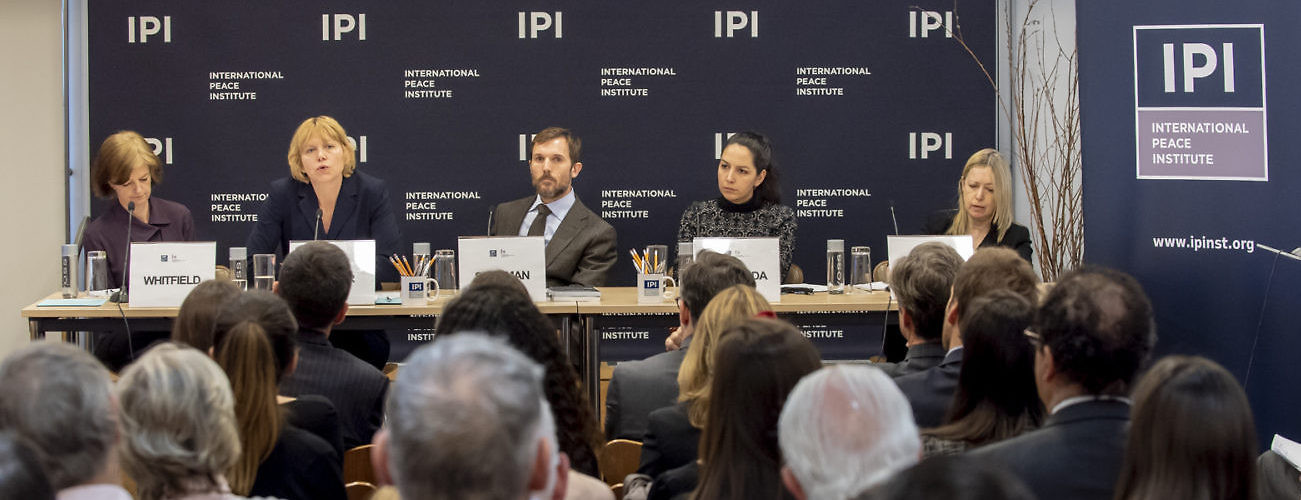An April 19th policy forum at IPI took up the vexing dilemma that arises when peacemakers face choices between settling an armed conflict and holding to account those responsible for severe human rights violations.
“Many think that peace is more important than justice or vice-versa,” said Christian Wenaweser, Permanent Representative of Liechtenstein to the United Nations, which co-sponsored the event with IPI. “To reconcile the two is a challenge, but I think it’s extremely important to not have a black-and-white approach to these questions because that’s not an approach that will bring positive answers.”
He identified a disconnect in his own experience between how the dilemma is addressed at the UN and how it is seen in the field. “When I talk to Syrian civil society representatives, the first thing they tell me is ‘we want justice,’” he said. “When I talk to my colleagues on the Security Council, the last thing they talk about is justice.” Making it clear which approach he favored, he said, “You need to talk to the people who own the country, I mean, they are the people who have to live the peace and have to find a peace.”
Priscilla Hayner, member of the UN’s Standby Team on Mediation and author of the book The Peacemaker’s Paradox: Pursuing Justice in the Shadow of Conflict, cited the negotiated end in 2016 of the half century-old conflict between Colombia and the FARC guerrilla group and said it pointed to a fruitful middle path. “A solution was possible through a creative and context-specific response that was neither a deal of impunity nor was it what we might call ‘maximalist justice’ that would not take into account the context of transition out of war,” she said.
Critical to its success, she said, was the involvement of victims of violence in the Havana-based negotiations that produced the settlement. “They played a central role in actually taking part in attending the talks in Havana as well as undertaking many national and regional fora, discussions, and consultations to get input, and that was very important to increase the legitimacy of the final deal.”
Natalia Arboleda, Counsellor at the Permanent Mission of Colombia to the UN, explained that with the cooperation of the UN and the Catholic church, the government had managed to take 60 victims from all sides of the conflict to the negotiating table where they openly discussed their involvement in the violence. “These are men that were used to war, and you saw them really touched by the victims’ stories and their suffering, it was a very human thing, and it actually changed them and made them want to acknowledge their responsibilities,” she said. The end result was a compromise, she conceded, which meant that no side emerged with what it wanted going in. “But I think that the comprehensive truth, reparation and justice system was a creative way to solve the issue.”
Teresa Whitfield, Director of the Policy and Mediation Division of the UN Department of Political Affairs (DPA), said this was the way the Colombian process had dealt with the challenge often facing mediators of trying to bring people together who will never agree on a common narrative of a struggle but can agree on a way to end it. “If you’re a mediator,” she said, “you have to recognize that those sitting across the table from you or with you have most likely committed horrible things or been part of organizations which had done horrible things. A mediator, when approaching issues of peace and justice, must factor in these sort of intangible issues of emotion, memory, perception and grievance and how it relates to the broader peace and justice question.”
Ruti Teitel, the Ernst C. Stiefel Professor of Comparative Law at New York Law School, spoke of the series of trials and amnesties that occurred in Chile, Uruguay, and her native Argentina in the aftermath of the end of military dictatorships. “The amnesties or full disclosure were necessary to the peace,” she said, “because there had to be some modification or reinterpretation of ‘what is peace?’” for the settlement to be locally relevant. There isn’t a stable peace when a justice process is seen as imposed from the outside.”
Jake Sherman, Director of IPI’s Brian Urquhart Center for Peace Operations and moderator of the discussion, acknowledged that insisting on accountability mechanisms in peace agreements runs the risk of deterring those suspected of war crimes from coming to the negotiating table. “But, he added, “they can also facilitate peace processes by removing those most complicit in crimes and most opposed to peace.”








